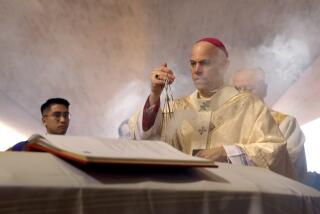For Bankruptcy Lawyer, No Time Like the Present
- Share via
SAN FRANCISCO — G. Larry Engel is seated in his cell, where he remains from morning until night. Engel occasionally uses the bathroom and even gets to huddle in a hallway, but otherwise he is glued to two telephones and a hand-held e-mail pager. Food is brought in at noon.
Engel is one of the state’s leading bankruptcy lawyers, and with the economy on a downswing, his advice is in high demand. So many corporate moguls want to talk to him that he cannot spare even a few minutes for a walk in the sunshine. Crisis looms everywhere.
For a prisoner, his accommodations aren’t bad. For more than 13 hours a day, he sits in a comfortable conference room. One wall-sized window overlooks the Bay Bridge.
The high-powered lawyer is holed up on the 28th floor of a high-rise on the city’s waterfront, the home of Brobeck Phleger & Harrison, an international business law firm that employees 950 attorneys. Engel heads the commerce and finance group and last year earned more than $1 million.
He is wearing a dark suit with a blue button-down shirt. No tie. He has gray hair combed to the side, a thick mustache and blue eyes. He resembles Richard Dreyfuss.
When he leaves his family in the suburbs shortly after dawn, the fog still shrouds the bay and curls around the bridge. It is now 9 a.m., and four lights on a telephone in front of him are flashing.
His cell phone also is ringing, and he is perusing his e-mail on his BlackBerry.
A secretary walks in with a message stamped urgent. To speak to a caller on his cell phone, he pushes a mute button on the office phone, half-listening to a conference call while he talks to his latest caller.
“This is where your leverage is,” Engel is telling a venture capitalist.
On the phone with another client, he concludes: “It seems to me two strikes, and he is out.”
Engel is part of a small and closely knit group of lawyers who thrive during dips in the economy. They seek to save failing companies, arrange purchases of inventory from ailing businesses and protect creditors who want to get paid when firms go broke.
“Bankruptcy used to be more of a stigma,” says Engel, who at 54 has been nursing foundering companies for nearly three decades. “Now it’s a strategic business tool.”
Bankruptcy lawyers in California are particularly busy now because they are representing thousands of companies owed money by the state’s two largest utilities, Pacific Gas & Electric, which has filed for protection under a Chapter 11 reorganization, and Southern California Edison, which some lawyers speculate will follow suit.
Engel is one of the lucky few with a client on the creditors committee in the PG&E; bankruptcy. He represents a Palo Alto municipal power agency, which PG&E; owes gobs of money. His representation on the 11-lawyer committee means he gets access to information about PG&E; and is able to have a say in the utility’s reorganization.
“In a bankruptcy, information is power,” he says. The debtor doesn’t want anyone to have it, he explains, and the lawyers on the committee have been required to take an oath of confidentiality.
Young associates wander in from time to time. One has advised a client on a legal question, but the client insists on speaking to Engel. “I told him yesterday but I don’t think he believed me,” the associate tells Engel.
The more experienced clients all demand “Larry.” They know they can get an answer from him in as little as five minutes. Sometimes it is not legal advice they want. They simply want to brainstorm with a savvy business lawyer, and they are willing to pay his $560-an-hour rate.
One of the crises on Engel’s lap this day involves the bankruptcy of a national fiber optic firm. Engel’s client wants the firm sold under Chapter 11 and asks Engel to help him ensure that a sister company will continue to be able to raise money from investors.
Engel wants to avoid a Chapter 7 liquidation. “The economic waste is so huge when you do that.”
But buyers are scarce. Engel says he has never before seen a business cycle in which so many buyers simply kick the tires and walk out of the showroom.
“Bankruptcy is like chess,” he says. “It’s about playing for position. Sometimes a pawn can make the difference if it’s in the right place at the right time.”
At times Engel reassures clients.
When an executive expresses concern about a lawsuit, Engel brushes the worry aside.
“You are confident,” the executive says. “Thank you. It makes me feel better.”
Another client is rattled after talking to Engel. His company wants to buy assets from a firm that is being liquidated outside a legal setting. Engel warns him that there may be liens against those assets.
Either reduce the purchase price to reflect the risk or force the company into foreclosure and buy the assets from a bank, he tells the general counsel of the well-known company.
“You are not making me feel very good about this,” the general counsel says. “I’m worried whether our business development team is getting snookered here.”
Engel loves advising corporate America. Each case fascinates him. When asked how he became a bankruptcy lawyer, he replies: “Luck.”
During a brief pause, Engel checks his voice mail: eight new messages, two of them marked urgent. And the calls keeping coming, holding him captive.
There is the San Diego lawyer whose client wants to close a $35-million real estate deal but faces a problem with a legal opinion.
There is the Brobeck lawyer who wants Engel to assemble a team to bid for work on the bankruptcy of a huge Australian insurance company with assets in California. Engel asks a secretary to find the version of his resume that emphasizes insurance insolvency.
There is the Internet company that is trying to raise money to stave off bankruptcy but is preparing for it nonetheless. Its general counsel wants to know if the company can give employees severance and relocation payments without antagonizing other creditors.
And so it goes, from 7:30 a.m. until 8:45 p.m. At that point, Engel looks out the conference room window. It is dark, and the lights of traffic dart across the Bay Bridge. The prisoner makes a break for it and heads home to his family.
More to Read
Inside the business of entertainment
The Wide Shot brings you news, analysis and insights on everything from streaming wars to production — and what it all means for the future.
You may occasionally receive promotional content from the Los Angeles Times.











